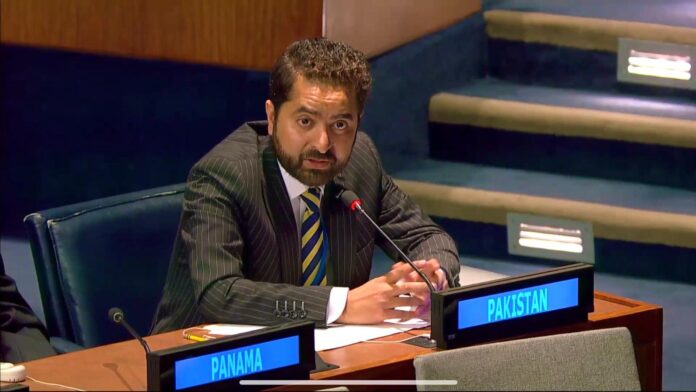UNITED NATIONS, Feb 21 (APP): Pakistan has underscored the need for strengthening the United Nations Observer Mission in India and Pakistan (UNMOGIP) so that it plays a “more effective” role in preserving peace and security along the Line of Control (Loc) in the disputed Kashmir region.
“We believe UNMOGIP has been and continues to play an important role in the maintenance of peace and security along the Line of Control in Jammu and Kashmir, in accordance with the relevant Security Council resolutions,” Pakistani delegate Ansar Shah told the UN Special Committee on Peacekeeping Operations, also known as C-34, which held its first meeting in the new year on Thursday.
The committee institutionalizes the General Assembly’s oversight on policy and execution of UN Peacekeeping Operations.
UNMOGIP was deployed in January 1949 to supervise the ceasefire between India and Pakistan in Jammu and Kashmir.
“We have always fulfilled our commitments in the implementation of UNMOGIP’s mandate,” Shah, who is first secretary at the Pakistan Mission to the UN, said.
While Pakistan allows UN observers to monitor the LoC, India does not.
The Rawalpindi-based group, which Pakistan hosts, is composed of 44 military observers, supported 75 civilian staff (25 International Staff plus 49 National Staff).
But even Pakistani delegate’s innocuous UNMOGIP-related remarks drew a protest from an Indian military official.
Colonel Tarunendra Pratap Singh, military advisor to the Indian Mission to the UN, called Pakistani delegate’s remarks “unwarranted”, saying they reflected Pakistan’s “compulsive obsession” with India.
“We yet again emphasize that the union territory of Jammu and Kashmir has been, and will be an integral part of India, ” Col. Singh claimed.
Ansar Shah sharply reacted to the Indian official’s remarks, declaring that “Jammu and Kashmir is not, never has been, and will never be an “integral” part of India.
“It is a disputed territory, whose ‘final disposition’ is to be decided by the people of Jammu and Kashmir through a UN supervised plebiscite, as demanded by numerous resolutions of the Security Council,” the Pakistani delegate asserted, while exercising his right of reply.
“No amount of fabrication and obfuscation can change the legal, political and historical reality.” he added.
Earlier, in his speech to the Committee, the Pakistani delegate said that peacekeeping was most effective as part of the overall ‘political strategy’ to resolve conflicts and build peace, adding that this strategy should embrace the entire peace continuum — from conflict prevention to conflict resolution.
“The safety and security of peacekeepers must be paramount,” he said, while calling he recent attacks on MONUSCO, the UN peacekeeping mission in Democratic Republic of Congo (DRC) and death of three UN peacekeepers, “unacceptable.”
“There should be greater accountability. Attacks on peacekeepers amount to war crimes.”
At the same time, Shah stressed that peacekeepers receive appropriate training and should be well equipped with adequate resources.
The UN, he said, must promote and adapt peacekeeping specific technologies which respond to the current peacekeeping requirements, such as day and night vision surveillance equipment, advanced IED (improvised explosive device) detection systems, explosive ordnance disposal, mine resistant and high mobility light tactical vehicles, telemedicine capabilities and state of the art medical evacuation facility.
Shah also called for equitable geographic representation particularly of Troop Contributing Countries and Police Contributing Countries in leadership positions.
Pakistan, he added, was committed to forging peacekeeping partnerships, especially with the African Union and the Organization of Islamic Cooperation (OIC).
In conclusion, the Pakistani delegate said, he looked forward to engaging in this year’s session constructively for producing clear, realistic and achievable recommendations for improving the UN peacekeeping.

